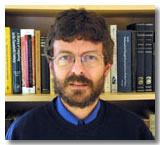|
||||
 |
Jesper
Lutzen University of Copenhagen, Denmark Dates of visit: April 8 - April 12, 2002 Professor Lutzen will give two lectures and a colloquium. The lectures will be on April 8, 10 and the colloquium on April 11. Lectures: Lecture: April 8, MS 6627, 4 - 5 PM.
Joseph Liouville (1809-1882) was the leading French mathematician in the generation between Galois and Hermite. He made important contributions to Sturm-Liouville Theory, transcendental numbers, differential geometry, mechanics, etc....In the talk, Professor Lutzen shall fit these works into a general biography of Liouville. Moreover, Lutzen will briefly analyze some of Liouville's highly interesting unpublished ideas that he left in his notebooks. Lecture: April 10, MS 6627, 4 - 5 PM In the year of his death Heinrich Hertz (1857-1894) published a book on the Principles of Mechanics, in which he gave a new foundation of classical mechanics. It is remarkable for three reasons:
In the talk, Lutzen will briefly deal with the first two of these novelties, and dwell on the last one. In particular, Lutzen will show how Hertz's construction of his Riemannian metric of configuration space influenced his image of matter and how his introduction of components of vectors were influenced by the Hamiltonian formalism. Finally, Professor Lutzen will compare Hertz's geometric formalism with other geometrizations of mechanics, suggested by mathematicians such as Lipschitz. This will throw Einstein's geometrization of gravitation into relief. Colloquium: April 11, MS 6627, 4--5
PM. In this talk, Professor Lutzen will illustrate some of the general trends in the development of mathematical analysis by considering its most basic element: the concept of function. Lutzen will show that its development was shaped both by applications in various domains, such as continuum mechanics, electrical engineering, and quantum mechanics, and by foundational issues in pure mathematics, such as the strive for rigor in 19th century analysis and the structural movement in the 20th century. In particular, Lutzen will concentrate on two great changes in the concept of function: first the change from analytic-algebraic expressions to Dirichlet's concept of a variable depending on another variable in an arbitrary way, and second, the invention of the theory of distributions. |
||||
|
|
|
|
People | Seminars & Colloquia | News | Media Page | UCLA Department of Mathematics For questions or comments please contact webmaster@math.ucla.edu |
